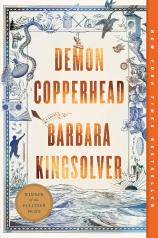Reading Group Guide
Discussion Questions
Demon Copperhead

1. Consider the epigraph from Charles Dickens’ DAVID COPPERFIELD that begins the novel: “It’s in vain to recall the past, unless it works some influence upon the present.” What do you understand this to mean? How is this idea relevant to the novel?
2. What might Demon mean when he claims that “the born of this world are marked from the get-out, win or lose”? To what extent is this true? What is a destiny? What’s the relationship between social or economic privilege and destiny?
3. What might explain Demon’s attraction to superheroes, and in particular the “superhero rescue”? In what ways can such a fantasy be helpful? How might such stories be limiting or even harmful to people who are suffering?
4. In what ways are Demon and his boyhood friend Maggot similar or different? What might explain their strong friendship? Why does it change over time? What powerful difficulties different from Demon will Maggot encounter as he gets older?
5. What is important about drawing for Demon? What does this skill afford him at different stages of his life? What does it mean to be creative? How might this be an important part of any life, even if one is not an artist?
6. In what ways is Demon’s mother troubled? What might explain what Demon calls her “bad choices,” and how does he navigate his love and anger with her? Does the reader’s sympathy for her shift as we learn about her history in the foster care system?
7. Why is the city so shocking and difficult for Demon? What might it mean that “there was no outside anywhere”? Despite its problems and poverty, what did the rural environment of Lee County offer Demon and others that was valuable? What might it mean that spending time in the woods “can set you back on your haunches, in a good way”? What’s the difference between “country poor” and “city poor”?
8. In what ways are various social workers helpful or not for Demon? What is Miss Barks able to offer him? What are the limitations of even well-intentioned case workers? In what ways are the flaws systemic? What disturbing social values about children are revealed by a debilitated and dangerous foster care system?
9. Why is Tommy Waddles important to Demon when they meet at Mr. Crickson’s farm? What does he demonstrate and provide later when he works at the newspaper?
10. What makes Fast Forward such a powerful charmer of people? What might explain why the people he mistreats so badly stay loyal to him? In what ways is he “a monster”?
11. At one point Demon realizes that “being mad was the one thing holding [him] together.” What is he angry about? In what ways might anger be important? What determines when it becomes harmful or destructive to oneself or others? How can anger best be eased?
12. In what various ways is Betsy Woodall, Demon’s grandmother, different from the other adults in Demon’s life? What does she value in life? Why might she have chosen to only help raise and educate girls?
13. In what ways does Demon’s life change once he moves in with Angus and her father and begins middle school? Why is teacher and guidance counselor Mr. Armstrong particularly valuable?
14. Coach claims that most of the boys of Lee County “just go looking for trouble because it’s what they know.” What does this mean? Why can it be so difficult to avoid self-destructiveness and make changes for the better?
15. What arguments does Mr. Armstrong make about stereotypes of various kinds, based on class, race and culture? Why have he and his wife chosen to stay in southern Appalachia?
16. What powers have influenced the economic and industrial history of Lee County and surrounding areas? How have they shaped these characters’ ideas about work, education and self-worth? What does the novel reveal about limited opportunities and structural poverty in Appalachia, and how they are typically interpreted by outsiders to the region?
17. What is the “wanting disease” that Demon suffers? What does he mean when he says, “I had everything and still went hungry”? Why does Demon feel unseen? What role might this play in the way he falls for Dori, and his claim that there’s a fine line between love and addiction?
18. Discussing the prescription painkiller epidemic in Lee County and across the country, June says, “They did this to us.” Who is she saying is responsible? What are the various mechanisms and powers that created such widespread pharmaceutical harm and abuse? In what ways were many of the people of Lee County particularly vulnerable to such addictions?
19. What is trauma? What are the many forms of it experienced by the characters of the novel? What are the various effects and symptoms of trauma? What are powerful and effective ways to begin healing from it?
20. Beyond addiction recovery, what will be involved in Demon’s efforts to build and sustain a healthy life? What does emotional rehabilitation look like? How does a person develop self-worth if they were rarely made to feel worthy?
Demon Copperhead
- Publication Date: August 27, 2024
- Genres: Fiction
- Paperback: 560 pages
- Publisher: Harper Perennial
- ISBN-10: 0063251981
- ISBN-13: 9780063251984







